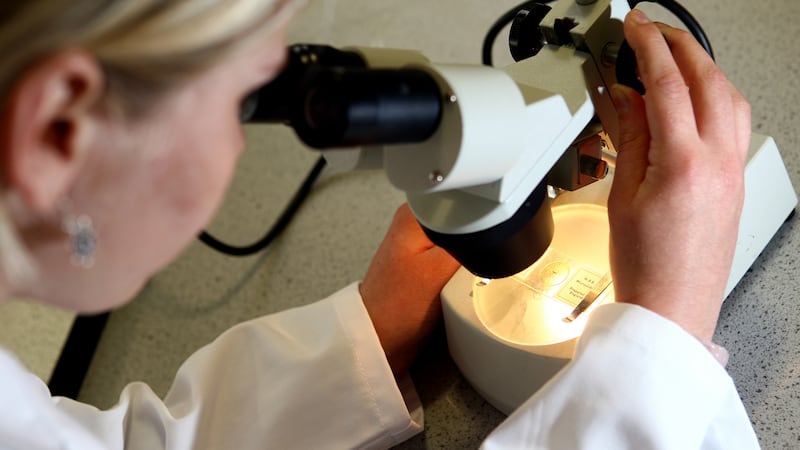I’ve always believed that when a country sends its military to war its people should support the armed forces, while always questioning robustly why their deployment was necessary.
Two years ago, my son and I took part in a cycle for Cooperation Ireland and the IRFU Charitable Trust. We travelled first to Dublin to see various sites connected to the Easter Rising. Then we went to the First World War battlefields in Belgium and northern France.
The trip was all the more poignant because my son was the same age as many who had died in those conflicts. To give an idea of the scale of the slaughter, the huge Somme memorial lists the names of 70,000 men who were killed, but it includes only those whose bodies were not recovered after the battle.
In an imperfect world, conflicts will always happen, but it’s important that those in positions of responsibility do all they humanly can to prevent violence. Once conflict ends, we are inevitably left with the task of repairing the relationships, infrastructure and economies that have been destroyed.
The battlefields made a powerful impression on my son and me. At the time, I initially formed three new thoughts. Firstly, if a poet encourages people to go to war, he should be told to stick to poetry and if he talks of ‘blood sacrifice’, we should ensure that it is his blood that is sacrificed first. Secondly, if our politicians declare war, they should be prepared to have their children at the front first. Only then can we be sure that they exhausted every avenue to avoid conflict. Thirdly, it is best, where possible to keep our children out of the hands of generals.
As a friend rightly pointed out, the generals were only prosecuting war using the tactics of the time. It is the politicians who put our children in the hands of generals and it is they who can ultimately cause and prevent conflict.
Too many politicians throughout the ages have failed to understand this basic responsibility.
In 1914, the United Kingdom was left with no alternative but to go to war with Germany. The soldiers bravery was incredible, yet it was a collective failure of politicians in Europe that failed to prevent so much death and destruction. In Ireland, a failure of leadership and an abdication of responsibility caused several waves of violence and conflict from 1916 on.
As we look to the future, ideally every 16-year-old should visit the battlefields of northern France and Belgium, irrespective of their background. Then they would be better informed as to the effects of conflict and the consequences of listening to voices who promote hatred of the ‘other’.
TREVOR RINGLAND
Holywood, Co Down
Eleventh hour ceremony only glorifies imperial wars
As we approach the commemoration of the end of the First World War many people will find it difficult to participate as the ceremony has been used in the past as an elitist and triumphant ritual, that has glorified imperial wars. The use of the poppy in this part of the world has become a political symbol by unionists and loyalist paramilitaries alike, and thus a means of alienation of most nationalists. I do believe, however, we should remember all those who died in this awful conflict in terms of personal sacrifice and in the recognition of the many Irishmen who died in the belief of liberating small nations including their own. One can remember and pay respect without the formal gathering and in the absence of the poppy. I shall be remembering my forebearers who lost their lives in this imperial war and respect their valour without judgment on their reasons for participation.
I shall also remember that this a great folly still unlearned and born on the idolatry of monarchs and their ambitions. The king and the kaiser, first cousins and rivals since their childhood days on the Isle of Wight, competing with their subjects live. The Royal family of Romania and Russia all competing descendants of Queen Victoria and in letters to one another expressing their wishes for gains from the war.
What irks me is that the descendants of this ideology of monarchism will have pride of place at every ceremony, as if they suffered the most, while in reality they should hide in shame. The tone of this will also reflect in greater detail and emphasis the loss of English soldiers to the neglect of many nations and the complete absence of any mention of the seven million innocent civilians sacrificed for imperial ambitions, a sacrifice that continues today in America’s attempt to rule the world. Let us all remember silently on the 11th hour and translate our sadness for something positive of today.
FRANCIS RICE
Belfast BT11
SF should end sterile policy of abstentionism
A thousand nationalist signatories from both parts of Ireland have published an open letter to the Taoiseach in The Irish News (November 5) calling on him to ensure the rights of northern nationalists in the wake of Brexit. In response to a similar letter last year, the taoiseach in December 2017 gave a pledge to protect the rights of northern nationalists and all Irish citizens “regardless of their political persuasion or religious beliefs”. It is patently obvious to everyone that both the taoiseach and the tánaiste have being honouring that pledge throughout the current negotiations with the EU.
In their open letter these 1,000 signatories quite correctly cite the DUP as the main threat to these rights given the current dependence of the British government on their votes. Given this factual assessment can I suggest that these same signatories write a similar letter to another political player who are able to exercise potentially what could be an even more pivotal influence in neutralising the influence of the DUP – this party is Sinn Féin. In any final vote at Westminster on the Brexit deal, Sinn Féin MPs would have seven votes.
The political arithmetic at Westminster for securing the correct political decision which would protect the rights of citizens in both parts of Ireland is on a knife edge. In recent votes on the Brexit issue the Conservative government was able to secure a majority of only five votes. These 1,000 signatories should ask Sinn Féin to end their sterile policy of abstention.
After all, abstentionism has never been an issue of political principle for Sinn Féin. They operated a policy of abstentionism in relation to other elected institutions including the Dáil and Stormont and ended it when it suited them. And on this occasion ending their abstention of Westminster and participating in all votes on Brexit would best serve the interest of all citizens in both parts of Ireland.
JOHN CUSHNAHAN
Former Fine Gael MEP and Leader Alliance Party
Human condition is too greedy
Man has lost the capacity to foresee and to forestall. He will end by destroying the earth.’ – Albert Schwitzer (French Theologian)
A grim but appropriate comment that applies to a just published report by the Worldwide Fund for Nature (WWF). An alarming verdict on the steep wildlife decline of more than 60 per cent since 1970 – 50 years of beating nature into submission rather than a better chance of survival by accommodation.
Global warming, plastic pollution, environmental damage create an apocalyptic triangle. World population is estimated at around seven billion and increasing. An insatiable demand for cheap food is creating soil and fresh water depletion problems.
Large scale cattle rearing for the fast food industry is an environmental time bomb. The slogan for the next decade could be ‘eat less meat’.
The world is entering a very dangerous phase but I observe no politician of gravitas even attempts to speak with authority on the earth’s survival.
Keats wrote: ‘The sedge is withered from the lake and no birds sing.’
A potential hellish future for the next generation.
Maybe artificial intelligence (AI) could unexpectedly assist with some solution because the human condition is too greedy, contrary and confrontational.
BRIAN WILSON
Craigavon, Co Armagh







